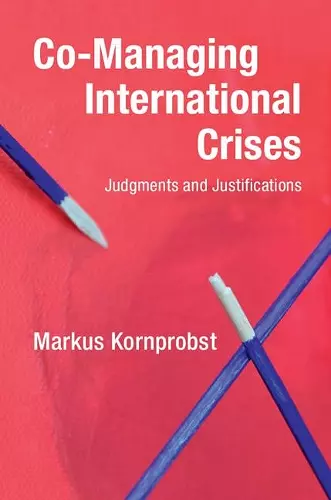Co-Managing International Crises
Judgments and Justifications
Format:Paperback
Publisher:Cambridge University Press
Published:25th Apr '19
Currently unavailable, and unfortunately no date known when it will be back
This paperback is available in another edition too:
- Hardback£75.00(9781108496407)

How do states succeed or fail in managing crises together? Kornprobst examines the structures and processes of cross-national crisis co-management.
How do states succeed or fail in managing international crisis together? Examining six leaders - Mitterrand, Chirac, Kohl, Schröder, Major and Blair - Kornprobst shows how actors make judgments, revisit them while interacting with a plethora of domestic and international actors, and, in doing so, learn lessons for co-managing the next crisis.Markus Kornprobst examines the common assumption that states usually respond to crises individually, rather than together. He develops an innovative approach to analyse how crisis co-management comes to succeed or fail. He argues that actors draw from repertoires of taken-for-granted ideas, forming a set of pre-judgments. These are then revisited in justificatory encounters, making various degrees of co-management possible or impossible. This judging and justifying in turn leaves an impression on repertoires put to use for co-managing the next crisis. The author uses this model to analyse the attempts by France, Germany and the United Kingdom to co-manage the crises in Bosnia, Kosovo, Afghanistan and Iraq. He links individual reasoning and communication, paving the way for further research into crisis co-management, and providing novel insights into European attempts to act in international affairs.
'Written by a world leading constructivist thinker, this book combines intellectual sophistication with meticulous empirical analysis to provide a superb theoretical account of the co-management of international crises. A must read for scholars and practitioners of international relations.' Corneliu Bjola, University of Oxford
'In this rich, theoretically rigorous and meticulously researched book, Markus Kornprobst brings forth the micro-foundations of crisis management, especially those involving multiple parties. This is an impressive and valuable contribution on a long-neglected subject and a must read for all those who are concerned about international crises and world order.' T. V. Paul, James McGill Professor of International Relations, McGill University, Canada and author of Restraining Great Powers: Soft Balancing from Empires to the Global Era
'This is one of the first books which analyzes the co-management of major international crises by showing how the judgments of European decision-makers is highly dependent on the nature of their communication. A brilliant demonstration on how research can combine psychology of leaders and communication circuits to understand major international decisions.' Christian Lequesne, Sciences Po – CERI, Paris
'This conceptually sophisticated and empirically rich study emphasizes the importance of reasoning and communication. Most crises involve multiple parties who must formulate and pursue common goals if they are to succeed. Drawing on literature in international relations, sociology, and psychology, Kornprobst develops an elegant and compelling theoretical framework that examines actor political beliefs and commitments, how they promote possible understandings of a challenge, efforts to communicate and justify these understandings, and subsequent reflection and possible reframings in the course of mutual interactions. He demonstrates the utility of the framework in crises confronted collectively by Britain, France, and Germany. The book should become a classic in the field.' Richard Ned Lebow, King's College London
'… the stimulating perspective of Kornprobst genuinely connects theories of communicative action inspired by Jürgen Habermas with the work on social practices of Pierre Bourdieu, therefore demonstrating how profitable European social theories can be to students of IR.' Léonard Colomba-Petteng, European Review of International Studies
ISBN: 9781108733762
Dimensions: 228mm x 153mm x 17mm
Weight: 560g
346 pages